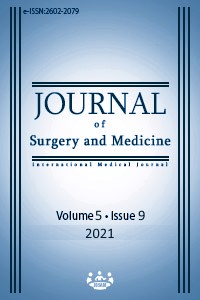Comparison of anterior tab flap and underlay tympanoplasty techniques in anterior tympanic membrane perforations
Keywords:
Anterior tab flap, Tympanoplasty, Anterior pull-through, Kerr flap, UnderlayAbstract
Background/Aim: Closure of anterior tympanic membrane perforation is surgically demanding with high rates of graft failure. The anterior tab flap (ATF) technique is a modification of underlay tympanoplasty which claims higher success rates for repairing anterior and subtotal perforations. Our main aim was to compare graft take rates of ATF and underlay techniques in anterior tympanic membrane perforations. Method: In this retrospective cohort study, 41 patients with anterior tympanic membrane perforations who underwent tympanoplasty at a tertiary referral center were analyzed. The patients were grouped according to the technique used. Demographic, clinical, and follow-up information as well as preoperative and postoperative 6th-month audiometric data were collected and compared between the groups. Results: Four patients were lost to follow-up. Eighteen patients in the ATF arm and 19 patients in the underlay arm were compared. Graft take rates were 94.4% in the ATF group and 73.7% in the underlay group (P=0.180). An air conduction threshold average of <30 dB was observed in 76.5% in the ATF group and 63.1% in the underlay tympanoplasty group (P>0.05). The postoperative ABG of the ATF and underlay group patients were less than 20 dB in 76.5% and 78.9%, respectively (P>0.05). No graft lateralization, anterior blunting, or cholesteatoma were observed. Conclusion: ATF is a safe and effective technique with a higher success rate for repairing anterior tympanic membrane perforation.
Downloads
References
Baba S, Fujikura T, Pawankar R, Yagi T.Subjective evaluation of post-tympanoplasty hearing in relation to the pure tone threshold. AurisNasus Larynx.2004 Dec;31(4):347-51.
Barake R, El Natout T, Bassim M, El Natout MA. Loop underlay tympanoplasty for anterior, subtotal and total tympanic membrane perforations: a retrospective review. J Otolaryngol Head Neck Surg. 2019;48:12.
FischU, May JS, Linder T. Tympanoplasty, Mastoidectomy and Stapes Surgery. Second Edition.Thieme Group. 2008: page 45.
Faramarzi A, Hashemi SB, Rajaee A. “Mucosal pocket" myringoplasty: a modification of underlay technique for anterior or subtotal perforations. Am J Otolaryngol. Nov-Dec 2012;33(6):708-13.
Harris JP, Wong YT, Yang TH, Miller M. How I do it: Anterior pull-through tympanoplasty for anterior eardrum perforations. Acta Otolaryngol. 2016;136(4):414-9.
Bailey HAT Jr. Symposium: Methods of reconstruction in tympanoplasty. II. Maintenance of the anterior sulcus-tympanic membrane relationships in tympanoplastic surgery. Laryngoscope. 1976 Feb;86(2):179-84.
Primrose WJ, Kerr AG. The anterior marjinal perforation. Clin Otolaryngol Allied Sci. 1986 Jun;11(3):175-6.
Sharp JF, Terzis TF, Robinson J. Myringoplasty for the anterior perforation: experience with the Kerr flap. J Laryngol Otol .1992 Jan;106(1):14-6.
Scally CM, Allen L, Kerr AG. The anterior hitch method of tympanic membrane repair. Ear Nose Throat J. 1996 Apr;75(4):244-7.
Faramarzi M, Atashi S, Edalatkhah M, Roosta S. The effect of anterior tab flap technique on graft success rate in large tympanic membrane perforation. Eur Arch Otorhinolaryngol. 2020 Jul 27. Online ahead of print.
D'Eredità R, Lens MB. Anterior tab flap versus standard underlay myringoplasty in children. Otol Neurotol. 2009 Sep;30(6):777-81.
Downloads
- 538 500
Published
Issue
Section
How to Cite
License
Copyright (c) 2021 Fatih Mutlu, Kasım Durmuş, Murat Öztürk, Hasan Mervan Değer
This work is licensed under a Creative Commons Attribution-NonCommercial-NoDerivatives 4.0 International License.
















